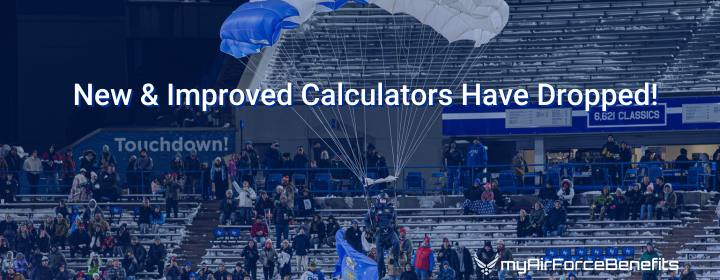Estimate the benefits provided to the surviving family members of a service member in the event of the service member's death by viewing Survivor Benefits Reports and performing "what-if" exercises to see how your Survivor Benefits might change. Estimates include lump sum amounts and show how the annuity changes over time as the spouse and child(ren) age, providing estimates for estate planning.
Access to the Survivor Benefits calculator requires a CAC or DS Logon. This allows a service member's personnel data to populate the calculator fields for a personalized estimate of financial and educational benefits.
Sign up for a DS Logon here.
Related Fact Sheets
- Air Force Aid Society (AFAS)
- Airman and Family Readiness Center (A&FRC)
- BENEFEDS (FEDVIP)
- Burial and Memorial Benefits
- Burial in Arlington National Cemetery
- Airman and Family Readiness Center (A&FRC)
- Continued Housing Benefits (for Survivors)
- Continued Health Care Benefit Program (CHCBP)
- Death Gratuity
- Dependency and Indemnity Compensation (DIC)
- DoD Homeowners Assistance Program (HAP)
- Family Servicemembers Group Life Insurance (FSGLI)
- Federal Long Term Care Insurance Program (FLTCIP)
- Federal Taxes on Veterans' Disability or Military Retirement Pensions
- Financial Readiness
- Fry Scholarship
- Legal Assistance Services
- Montgomery GI Bill (MGIB)
- Post 9/11 GI Bill
- Relocation Assistance
- Servicemembers Group Life Insurance (SGLI)
- Social Security Lump Sum Death Benefit
- Social Security Survivor Benefits
- Survivors’ & Dependent Education Assistance Program (DEA)
- Traumatic Servicemembers' Group Life Insurance (TSGLI)
- TRICARE Dental Program (TDP)
- TRICARE Prime
- VA Aid and Attendance (A&A) and Housebound Pension Benefits
- VA Home Loans
- VA Survivors Pension (Formerly VA Death Pension)
- Veterans Group Life Insurance (VGLI)
Featured: Reunion

The return home from combat can often leave servicemembers feeling out of place with the most important people in their lives - their families.
"In deployment, Soldiers grow accustomed to a new lifestyle and a new 'family' - those buddies that bond together to defend each other," said Maj. Ken Williams, 14th Military Police Brigade chaplain. "This lifestyle change is prolonged and becomes familiar, i.e., the new normal."
The families also change while the Servicemember is deployed.
"The family is a system," Williams said. "When one family member is absent, the whole system changes. All members of the family adapt to a new 'normal' way of life."
When the servicemember returns, the family may feel uncomfortable with each other, and the servicemember may withdraw from the family.

